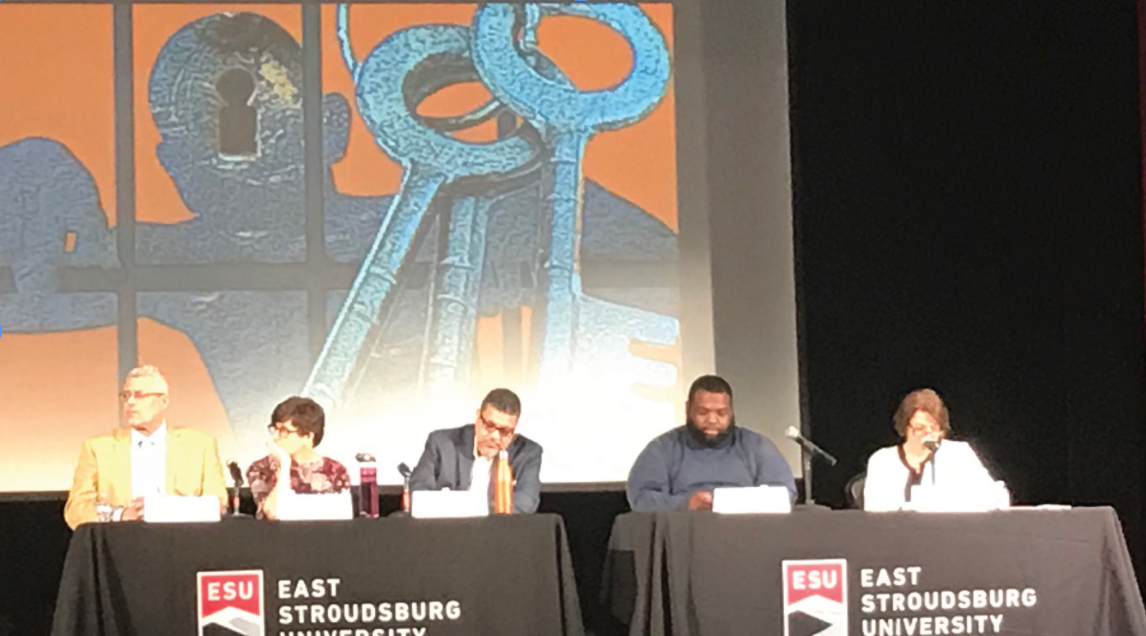
Angela Pender
Staff Writer
On Saturday March 30, East Stroudsburg University hosted the Criminal Justice Reform in Pennsylvania: Navigating the Path Forward, in the Abeloff Theatre where many representatives of the government attended to talk to students about the injustices that people of color face while being held under the criminal justice system.
This event was also hosted by ESU’s Multicultural Affairs and Black Student Union. BSU’s President, Brandon Teel, also was a speaker at this forum where he spoke on prison reform and advocated that other people also get involved with this movement.
Teel said students’ voices matter. If you want to see a change, it starts with having a voice. He also talked about how children do not have a fair chance and get to learn from their mistakes because they don’t have any consequences at home.
“If homes are broken, how do we expect to fix it,” Teel said.
State Representative Jordan A. Harris agreed with Teel and believed that children are being taken away the opportunity to learn from their mistakes because they immediately get arrested.
He said, “No one is teaching young people about their anger, which is why they pick up a gun.”
He added that children should not be charged as an adult because they still have a mindset of a child and should be not be handed serious jail time.
Speaker Amy Gulli, who is a director under Auditor General Eugene Depasquale, also addressed prison reform and how Pennsylvania spends a lot of money on keeping inmates incarcerated, but does not spend money on actual luxuries to enhance the state. She states how Pennsylvania is “addicted to incarceration” and does not give people behind bars the benefit of the doubt.
Gulli also mentioned how Pennsylvania’s prison population is rapidly increasing and the state is building more prisons instead of building more centers to help those who are in jail.
She said, “40 years ago, Pennsylvania had 7 prisons, today we now have 25. A Pennsylvania prison center holds 50,000 prisoners and cost Pennsylvania tax payers 2.4 billion dollars annually, an increase in almost 600 percent in the last 3 decades. Simply put, Pennsylvania spends too much on corrections because it incarcerates too many people and keeps them incarcerated for too long.”
Gulli continued and discussed the reasons why over incarceration is happening. She describes how the way people are sentenced are too harsh because judges have the option to choose different sentencing, but instead they choose incarceration over a sentence like probation.
Another reason why people are in jail for too long is because they can’t make bail. Depending on the charge, to make bail it can cost thousands of dollars, money of which an average working person cannot afford to make payments on and as a result keeps inmates in prison longer than expected.
A third reason why people are in jail for long periods of time is because people violate their conditions on their probation or parole, and a technical violation has nothing to do with committing to another crime, but it can result into more jail time.
Gulli prosed that inmates gain access to benefits that will help them succeed when they get out of prison such as housing assistance and mental health care that will help them get on their feet.
As a result of Pennsylvania’s mass incarceration rate, the panelists have attempted to make a change in the criminal justice system by implementing new laws. They have proposed an act called “The Clean Sleight Act” which says a formal prisoner will essentially have a “clean slight” when released from prison and charges cannot be found against them, unlike now which the law says if arrested, charges are still on record even if found innocent. This act will go in full effect in June.
Email Angela at:
apender1@live.esu.edu

